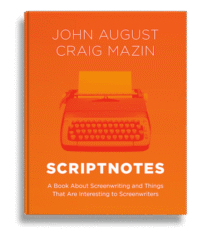 Our Big Orange Book is finally available in bookstores around the world today. We’ve gotten a ton of preorders and some terrific reviews.
Our Big Orange Book is finally available in bookstores around the world today. We’ve gotten a ton of preorders and some terrific reviews.
“Bound to be a staple, this guide, just like the podcast, is accessible, engaging, and informative” – Booklist
“August and Mazin’s volume stands out for its wealth of real-life examples taken from cinema and TV over the past decades, its humanizing tone, and its winning combination of the practical with the entertaining.” – Library Journal
“If you’re going to buy one book on screenwriting, then you should probably make it Scriptnotes by John August and Craig Mazin.” – Forbes
A few things you can do to help us out in this crucial first week:
→ Buy it wherever you buy books. Our official LA bookstore is Chevalier’s on Larchmont, which has some signed copies at least for the next few days. Signed copies are also available at Premiere Collectables for shipping worldwide.
→ Post about it on social media. Tag me (@johnaugust) and Scriptnotes (@scriptnotespodcast) on Instagram/Bluesky/Threads and we’ll repost ya.
→ Leave a review on Amazon or Goodreads. The early ones tend to set a tone.
We’re excited to see the book on shelves and in reader’s hands. Please enjoy it and share it with others!